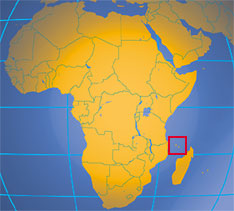 The Comoros (pronounced /ˈkɒməroʊz/; Arabic: جزر القمر, Juzur al-Qomor), officially the Union of the Comoros (French: Union des Comores, Arabic: الاتّحاد القمريّ, al-Ittiḥād al-Qomoriyy) is an archipelago island nation in the Indian Ocean, located off the eastern coast of Africa, on the northern end of the Mozambique Channel, between northeastern Mozambique and northwestern Madagascar. Other countries near to the Comoros are Tanzania to the northwest and the Seychelles to the northeast. The capital is Moroni on Grande Comore. At 1,862 km2 (719 sq mi) (excluding Mayotte), the Comoros is the third-smallest African nation by area. With a population estimated at 798,000 (excluding Mayotte), it is the sixth-smallest African nation by population—although it has one of the highest population densities in Africa. Its name derives from the Arabic word القمر qomor|. The archipelago is notable for its diverse culture and history, as a nation formed at the crossroads of many civilizations. Though in the contested island of Mayotte the sole official language is French, the “Union of the Comoros” has three official languages: Comorian (Shikomor), Arabic and French.
The Comoros (pronounced /ˈkɒməroʊz/; Arabic: جزر القمر, Juzur al-Qomor), officially the Union of the Comoros (French: Union des Comores, Arabic: الاتّحاد القمريّ, al-Ittiḥād al-Qomoriyy) is an archipelago island nation in the Indian Ocean, located off the eastern coast of Africa, on the northern end of the Mozambique Channel, between northeastern Mozambique and northwestern Madagascar. Other countries near to the Comoros are Tanzania to the northwest and the Seychelles to the northeast. The capital is Moroni on Grande Comore. At 1,862 km2 (719 sq mi) (excluding Mayotte), the Comoros is the third-smallest African nation by area. With a population estimated at 798,000 (excluding Mayotte), it is the sixth-smallest African nation by population—although it has one of the highest population densities in Africa. Its name derives from the Arabic word القمر qomor|. The archipelago is notable for its diverse culture and history, as a nation formed at the crossroads of many civilizations. Though in the contested island of Mayotte the sole official language is French, the “Union of the Comoros” has three official languages: Comorian (Shikomor), Arabic and French.
The country officially consists of the four islands in the volcanic Comoros archipelago: northwestermost Grande Comore or Ngazidja, Mohéli or Mwali, Anjouan or Nzwani, and southeastermost Mayotte or Mahoré, as well as many smaller islands. However, the government of the Union of the Comoros (or its predecessors, since independence) has never administered the island of Mayotte, which France still administers as an overseas collectivity. Mayotte was the only island in the archipelago that voted against independence from France in 1974; the latter has vetoed United Nations Security Council resolutions that would affirm Comorian sovereignty over the island. In addition, a 29 March 2009 referendum on Mayotte’s becoming an overseas department of France in 2011 was passed overwhelmingly by the people of Mayotte.
The “Union of the Comoros” is the only state to be a member of all of the following: African Union, Francophonie, Organisation of the Islamic Conference, Arab League (of which it is the southernmost member state), and Indian Ocean Commission. However, it has had a troubled history since independence in 1975, marked by numerous coups d’état. About half the population live below the international poverty line of US$1.25 a day.
Comoros has endured more than 20 coups or attempted coups since gaining independence from France in 1975. In 1997, the islands of Anjouan and Moheli declared independence from Comoros. In 1999, military chief Col. AZALI seized power in a bloodless coup, and helped negotiate the 2000 Fomboni Accords power-sharing agreement in which the federal presidency rotates among the three islands, and each island maintains its own local government. AZALI won the 2002 Presidential election, and each island in the archipelago elected its own president. AZALI stepped down in 2006 and President SAMBI was elected to office. In 2007, BACAR effected Anjouan’s de-facto secession from the Union, refusing to step down in favor of fresh Anjouanais elections when Comoros’ other islands held legitimate elections in July. The African Union (AU) initially attempted to resolve the political crisis by applying sanctions and a naval blockade on Anjouan, but in March 2008, AU and Comoran soldiers seized the island. The move was generally welcomed by the island’s inhabitants.
The Comoros is governed under the constitution of 2001. The president, who is head of state, is chosen from among the elected heads of the three main islands; the presidency rotates every five years. The government is headed by the prime minister, who is appointed by the president. The unicameral legislature consists of the 33-seat Assembly of the Union. Fifteen members are selected by the individual islands’ local assemblies, and 18 are popularly elected. All serve five-year terms. Administratively, the country is divided into the three main islands and four municipalities.
The inhabitants are a mix mostly of African, Arab, Indian, and Malay ethnic strains. Sunni Muslims make up 98% of the population; there is a small Roman Catholic minority.
With few natural resources, poor soil, and overpopulation, the islands are one of the world’s poorest nations. Some 80% of the people are involved in agriculture. Vanilla, ylang-ylang (used in perfumes), cloves, and copra are the major exports; coconuts, bananas, and cassava are also grown. Fishing, tourism, and perfume distillation are the main industries, and remittances from Comorans working abroad are an important source of revenue. Rice and other foodstuffs, consumer goods, petroleum products, and transportation equipment are imported. The country is heavily dependent on France for trade and foreign aid.
Modern musicians include Abou Chihabi, who composed the Comorian national anthem and who is known for his reggae-tinged pan-African variet music, reggae/zouk/soukous fusionists like Maalesh and Salim Ali Amir, and Nawal, a singer-songwriter and instrumentalist.









